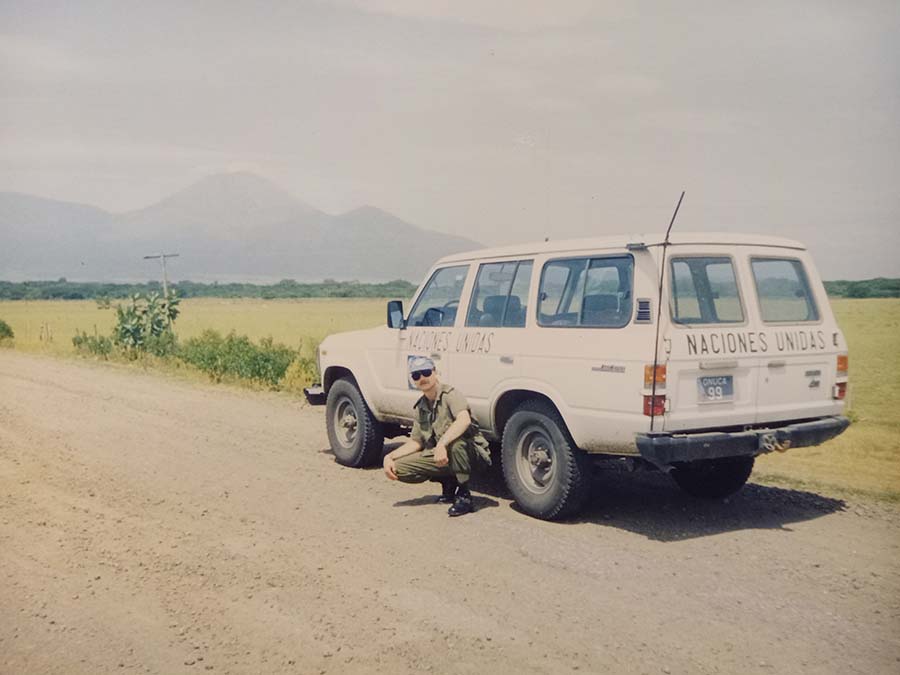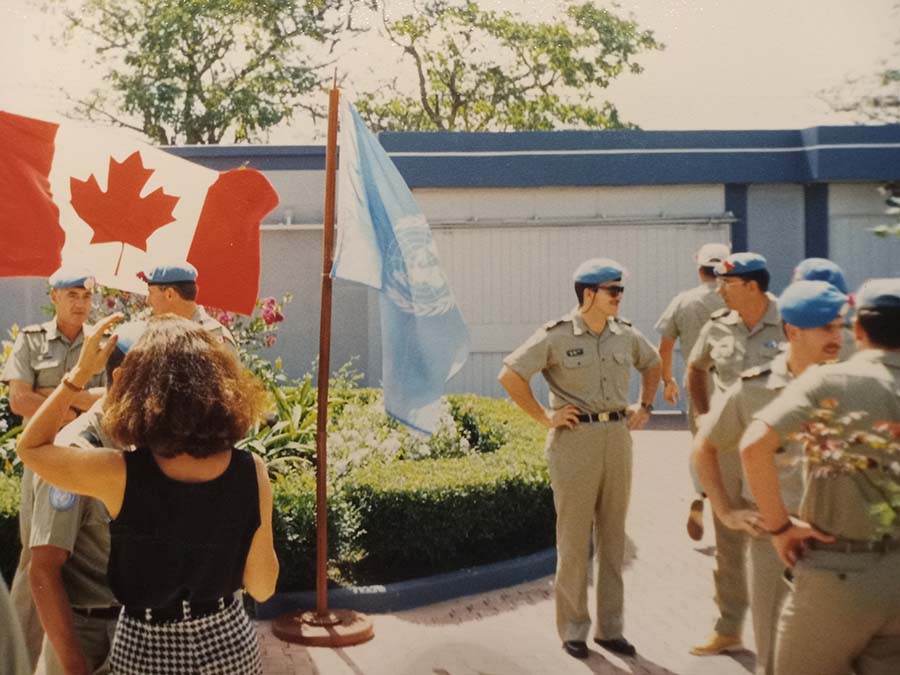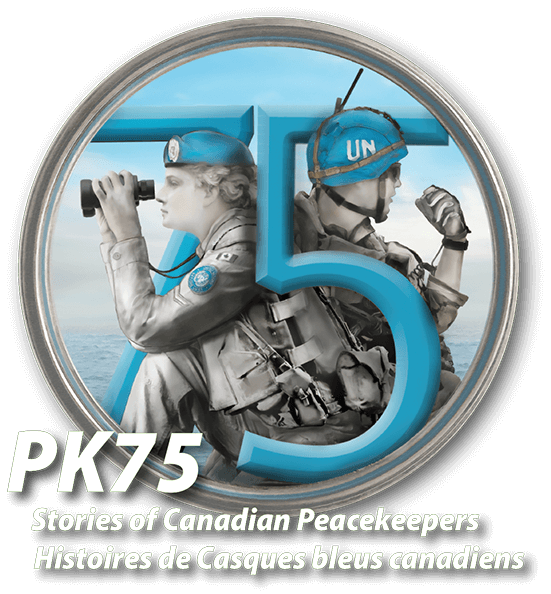

ONE BECAME FOUR
It all started quite innocently in the fall of 1990. After several discussions with some colleagues about their experience in serving as United Nations Military Observers (UNMO) on the United Nations Truce Supervision Organisation (UNTSO), a UN mission encompassing several countries in the Middle East, I decided to put my name as a volunteer for a peacekeeping operation.
My superior had just come back from an operation in Central America that covered five countries, aptly named the United Nations Observer Group in Central America (ONUCA). He told me that’s where I should go for my next posting and, although I nodded in the affirmative, I thought that my chances were slim. Come mid-January of 1991, I was surprised to receive my posting message stating I was posted to Operation SULTAN, the ONUCA mission.
The decisions and actions I took following this would be, unbeknownst to me, crucial in being deployed and redeployed on other Central American missions. First, as it was tradition in those days, or so I taught, I sent an introduction letter to the Commanding Officer, Major General Lewis Mackenzie. Secondly, although it was deemed an ‘’English-speaking mission’’ I decided to start learning Spanish, thinking that, since I will be living and working in Central America, it best would be to learn the language.
In May, I went to Longue-Pointe (Montréal), to receive the weeklong pre-deployment training with all the others going as UNMOs to this, or to other peacekeeping missions. It is also during that week that we learned Canada was decreasing its contributions to ONUCA and that some of us would not be deploying. My name was among them, so I immediately called my career manager who assured me I was going, as it had been requested by MGen Mackenzie himself. I attributed that to the introduction letter I had sent to him, something not everybody had done.
Arriving in Tegucigalpa, Honduras, in June, I was sent a few days after, to Chinandega, Nicaragua. I would learn later it was a place nobody wanted to go to, being remote and requiring learning the language, fast.
In January of 1991, we all learned that our mission, ONUCA would end by February. Soon after, we were told to move to another mission, next door, into El Salvador. So, we packed everything, and, before the end of January, I left Chinandega on the advance party, and drove to San Salvador, the capital of El Salvador. I was now posted to Operation MATCH, the United Nations Observer Group in El Salvador (ONUSAL). At first, we received several Canadians to help with the start-up of the mission, but after several weeks they had to return. Some fourteen other officers that had transferred from the ONUCA mission to ONUSAL also left early in March, primarily because this new mission was now being established as a Spanish-speaking mission. Thankfully, I had learned enough to allow me to stay on, which I did until August 1992.
In 1996, I was preparing, with 3R22eR, for a deployment to Haiti for the spring of 1997. Unexpectedly, a message arrived for me over the holiday season. They needed Spanish-speaking officers for a new mission in Guatemala, and it had precedence over other missions. In early January 1997, over 20 officers from different elements congregated in Kingston to receive pre-deployment training and to be tested by the Commanding Officer of the Canadian Contingent, Lieutenant-Colonel Alex Fieglar. The fact that he and I knew each other from our prior mission in El Salvador, and that I spoke Spanish, certainly contributed to my being posted to Operation VISION, the United Nations Verification Mission in Guatemala, MINUGUA. This mission was to deploy the first Canadian female officer as Military Observer, Capt. Eva Martinez, an excellent and well-respected officer. It was the first time that the Canadian contingent, 15 strong, move at once, transported by C-130 Hercules, initially to Eglin Air Force Base in the USA, then early next morning to Guatemala City.
Upon arrival on that mission, we had to prove, via an oral test, that we could speak Spanish. At first, it was somewhat insulting, but then we realised that the Spanish contingent had brough more officers than approved. Each and everyone of them were scurrying amongst other, non-Spanish-speaking contingents to find someone that could not speak the language, in order to replace them. No one from the Canadian contingent was booted out. That mission did not last very long, and by June1997 we were all back in Canada.
However, it was not to be the end of that mission. As we were leaving, the Canadian Ambassador, Mr. Dan Livermore, requested that Canada send a military Officer to join the five members of the RCMP already deployed with MINUGUA. A few months after being sent to Canada, I received a tasking message containing strict criteria to be adhere to. The officer was to be a Spanish-speaker, with past experience in Central America, past experience with the MINUGUA operation and, finally, on the last page, the names of three officers recommended for deployment. My name was there, along with two of my colleagues, Maj. P. Van Doesburg and Capt. C. Beltram. We all went but at different times. I was lucky to be the first one deployed in 1998.
Coming back in 1999, I was tasked to teach peacekeeping and United Nations Military Observer work at the Peace Support Training Centre (PSTC), in Kingston, ON, and soon thereafter I was posted to PSTC full time. In addition to those four UN missions, I had the opportunity in 1995 to serve with UNPROFOR. Finally, it was from Kingston that I left the military after 23 years and started working for the United Nations, here, there, and everywhere.
Biography
Claude Vadeboncoeur served 23 years in the Canadian Armed Forces as an Infantry Officer with the Royal 22ième Régiment. Besides serving with the Canadian Airborne Regiment, the R22eR, and various HQs he also served, in the 1990s, on five different peacekeeping operations, mainly in Central America, but also in Europe. After those, he was fortunate to transmit his experience and knowledge when posted as an instructor at the Peace Support Training Centre, in Kingston, ON. While there he was involved in teaching and training Canadian and foreign United Nations Military Observers (UNMOs) prior to their own deployment. He was also sent to Argentina and Poland to train Officers and troops.
Retiring in 2002, he has served with different United Nations agencies, funds, programs, and other organizations around the world, in the areas of safety and security. When not working, he was sailing in the Caribbean. His last deployment was in Guinea, Western Africa, where he was the Senior Advisor to the President of the country. He was responsible for the reform of the governance of five different ministerial Departments namely: Defence, Public Safety, Justice, Budget, and Environment. At the end of his tour, he received the National Order of Merit at the rank of Officer.
Claude has a Bachelor of Military Arts & Sciences, and a Master of International Negotiation and Policymaking. When not travelling or surfing, he lives in Sutton, QC.

Vehicular patrol in Nicaragua with some volcanos in the background, 1991.

On November 11, 1991, in Tegucigalpa, Honduras; Canadian Officers reunited for the traditional Remembrance Day Ceremonies.


